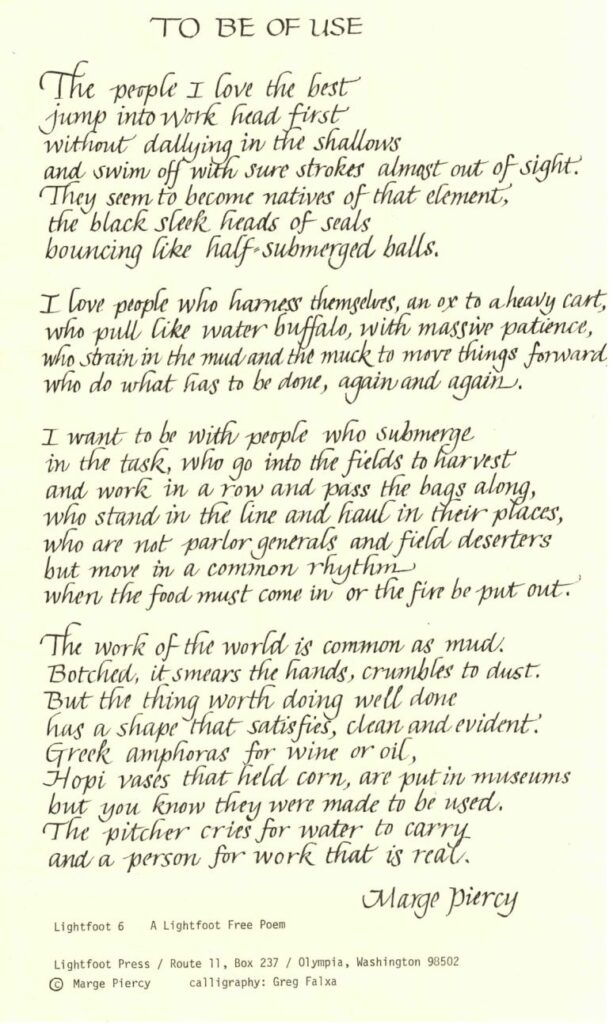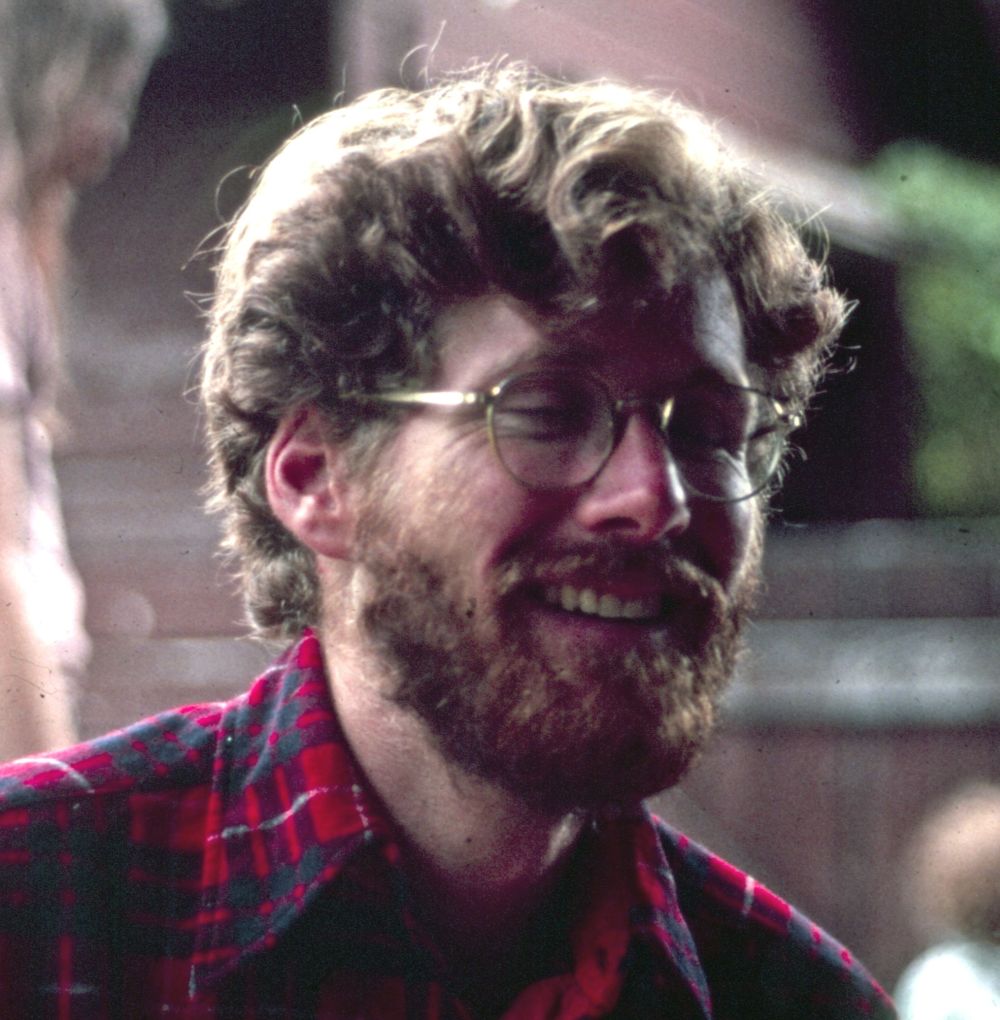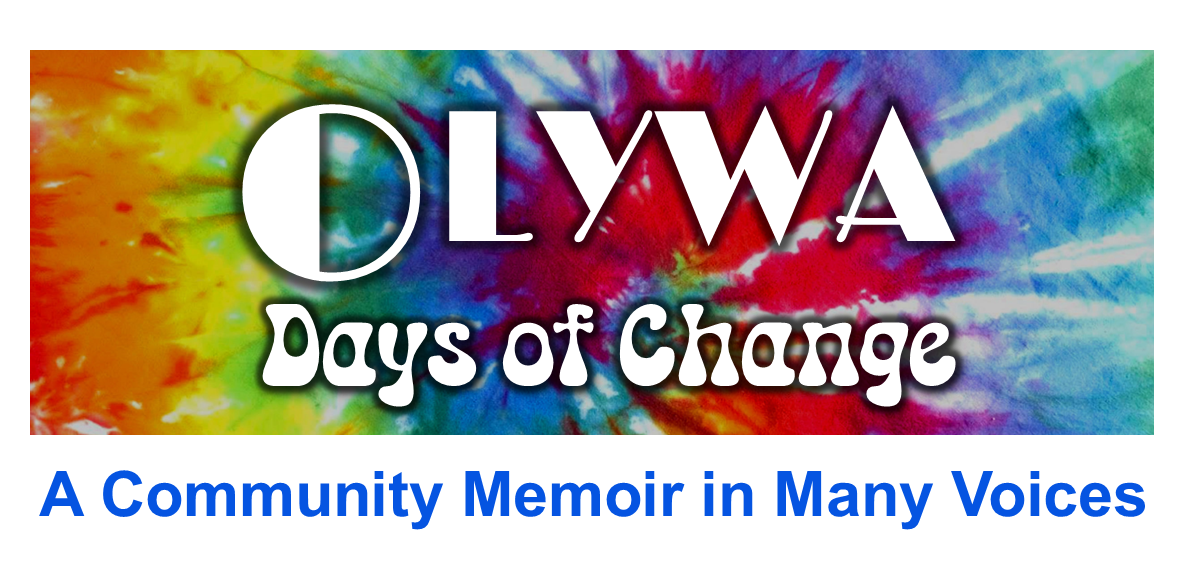FOOD
How ‘Small is Beautiful’ Led to a
National Organic Produce Distribution Center
By Gordon White
Farming in Olywa in the 1970s

One thing led to another for a group of us “back to the land, back to the water” small-scale organic growers. We came at it from different directions. Some of us expanded our vegetable gardens into small farms using nearby abandoned fields. Others of us had grown up on farms, or worked for conventional farmers during high school and college. Using skills learned in those experiences we started our own little farms. Some of us took to the waters of Puget Sound through marine studies at Evergreen and saw opportunities to grow shellfish. The Evergreen Organic Farm and its emerging organic agriculture program provided many of us with connections to the latest information on small-scale production methods.
We all shared a deep connection to nature and community. We shared an interest in direct involvement of producing, making, and selling food. It was beautiful working directly with households that wanted our vegetables. The Olympia Farmers Market was an important meeting and conversation place where we got to know each other as the market was forming. Together we realized the importance of connecting with and learning from the many other community members who had a vision of a community-centered market space.
It was a fun and full journey to follow the trial run of different farmers market locations:a vacant lot on Sleater-Kinney in Lacey/Mallville (big macs are sold there now); a big parking lot near the downtown Capitol Lake swimming area (yep, used to be a swimming area there); the Western Farmers parking lot on Plum Street and Union Avenue; a semi-permanent covered space on Capitol Way and Thurston Avenue before moving to the permanent location a few blocks north at Port Plaza.
A “means of production” kind of thing
We had a shared commitment to making a living by growing food in ways that would be more sustainable on the land and reconnect the community to the local food supply. Our backs were strong and our sleep needs minimal, so we swam into this “bargain with nature” with sure strokes and no fear. Several of us had that great Marge Piercy poem To Be of Use taped to the wall above our kitchen door or barn office desks, reciting the first line over and over as we cultivated, planted, and harvested:
The people I love the best
jump into work head first
without dallying in the shallows
Everything we were doing had risk and some element of reinvention. How we tilled the soil or set oyster seed was different from conventional methods. We had a certain faith that we could figure it out as we dove into the deep end. Farmers may have a reputation of being independent, yet our connection through Evergreen, the Farmers Market, and our cooperative approach to achieving our vision buoyed us through many crises. Plus we had lots of opportunities to see each other at meetings.

Our successes often came from sharing information with each other at the many meetings we attended . . . meetings to support the farmers market, to start an equipment sharing library, to support formation of a Pacific Northwest grower alliance called Tilth, to create the state Organic Certification Program. We may have toiled alone at our farms, but we definitely worked together in meeting after meeting to build on the existing organic growers movement.
Soon enough our production skills got better and better. Each of us realized we could grow more than was needed at the Olympia Farmers Market and Olympia Food Co-op. Some of us were selling in the Pike Place Market and to restaurants in Seattle. This created connections with the Puget Consumers Cooperative stores and their wholesale provider, a collectively-owned distributor called Community Produce based in Seattle.
Soon “Com Prod” trucks made stops for boxes of carrots, potatoes, and other veggies from Olympia area farmers. This also connected us to other organic farmers across the state. We continued to grow our land base and we worked together to consolidate pick-up locations for truckloads of produce for the Seattle market. One thing kept leading to another good thing . . . Then one day a Com Prod driver told us they were closing. The Seattle-based collective was unable to reach financial sustainability.
What would we do?
None of us on our own could afford to buy refrigerator trucks and make deliveries to Seattle and Portland. We in the Olympia area heard from other growers and food co-ops in Washington that they needed a distribution partner to deliver organic vegetables.
Our little Oly farmers group called another meeting. Folks from Seattle Puget Consumer Cooperatives (PCC) stopped in to pitch an idea for us to take on the role no longer filled by Community Produce. This was a big ask of the network of organic growers in Thurston County. It would take new skills and lots of learning to find a way to make regular deliveries of organic produce to the growing retail outlets. Meanwhile, our individual infrastructure needs had grown. Could we join together, organize and operate a business to run cold storage space, refrigerated trucks, and the sales staff needed? Once again we realized there was more to farming than working the fields and tidelands. One thing led to another . . . and in 1982, the Farmers Wholesale Cooperative (FWC) was born.
The inspiring and skilled local farming experts connected with Evergreen were important partners in our reach toward forming a wholesale cooperative. It was also fortunate that a small group of people had coalesced who had some working knowledge of the cooperative movement. They networked with many others from regional food co-ops. Plus some of the brilliant and committed people who worked at FWC came from Evergreen.
The organic start-up stumbles
And then we made a few mistakes. Our main plan had been a quick “back of the envelope” list of what it takes to become a distributor of organically grown food to local and regional outlets. We would need financing for a warehouse, refrigerated trucks, and operating loan to pay our employees to launch our “start-up.” Our experience to that point on our farms was most banks were not interested in an unproven product. So we chose the “pay as we go, sweat equity approach.” We needed customers and we let them determine what, when and how we would deliver their orders. This is where we initially strayed from our vision of an organic wholesale network for regional growers.
To keep our cash flow moving we sold LOTS of conventionally grown produce that we brought in to be able to service local restaurants year round and fill trucks. Cash flow was king, and selling conventional produce helped us meet our cash flow needs even though we underpaid all of our employees. And, some of our local customers did not want “organically grown” thinking it was substandard produce.
We used old trucks, rented warehouse space wherever we could find it, and were running all over for small amounts of things for any customer. Heck, one of our sales staff sold lemon thyme bunches out of their garden in order to meet a restaurant’s order. And there was no mention of organically grown. We were trying to stay alive/fill trucks but not really working towards our mission of distributing organic locally grown produce. Fortunately it also was not penciling out economically because it was so labor intensive and the numbers on supplying non-organic to small restaurants ran into the negative.
Organically grown was calling to our bottom line, we just needed to figure out how to get there. Our key staff noticed that outreach and education about organically grown had worked in other areas of the country. How about investing in promoting organically grown? How about a label telling the world who and what we are? Our manager and some of our lead staff developed a plan for how to get there. Most of us on the board of farmers were not sure we could afford it . . . yet we needed a different business model that was truer to our vision.
Return to our values
We had some more meetings and looked at regional trends in organically grown food and markets. We learned that more farmers wanted to join our cooperative distributor model and more stores wanted fresh locally grown produce. So we started to implement the plan recommended by our staff. We began selling only products grown by our members to the PCC stores and other co-ops in the region. We were forthright about who we were and what our product was (organically grown) and represented only farmers we knew and believed in. We added farmers who had product at times of the year that had been slow (early spring rhubarb and leeks, Central Washington grown organic asparagus and cherries, and then apples in fall/winter. We developed our own brand to label all our products. From twist ties, carrot bags, and produce boxes the Farmers Organic Wholesale Network was seen on store shelves. Importantly, the Farmers OWN brand had the double meaning, OWN being our own brand and also that it gave farmers ownership over some of the distribution of their product. The brand caught on and helped increase the organic demand and visibility of organic produce. Production in our region grew enormously.
Then PCC called and asked that we act as their main broker for organically-grown products year-round from Arizona and California. This meant a size and volume of product that matched our own organically-grown ethos. It also created broader support infrastructure we desperately needed to efficiently service our customers. We took our staff’s business plan to a local lender who saw that the details matched the vision and he approved the loan.
By 1986, FWC completed its purchase of a warehouse near Maytown in south central Thurston County. Thanks to a great group of people doing the day-to-day work at FWC and that open minded bank lender, we bought several cold storage delivery trucks and started moving produce to markets across the region and into Oregon. Eventually our FWC members’ products were sold across the country.
One thing led to another . . .
Soon FWC became a cornerstone for distribution of local and regional organic produce. Eventually, we outgrew our business ability to compete in the expanding marketplace for organic farm products. Mainline produce distributors that previously had not served small-scale organic farmers, now saw the success of FWC and used their substantial capital resources (more trucks, warehouse space, and marketing relationships) to offer organic produce at better prices to PCC. And many of us wanted to spend more time “back to the land” (or to leave for other pursuits) rather than brave more FWC board meetings and financial negotiations to compete with capitalism. It was time for the remaining FWC farmers to refocus on farming, our local farmers markets, and the emerging community-supported agriculture approach.
So, in the early 1990s we sold the business to Charlie’s Produce which continued to support and grow access to markets for organic farms across the state. Key to Charlie’s success was their hiring of one of FWC’s staff leaders who used incredible skills and knowledge to build a strong growers network.
One thing had led to another . . . Our big dream to connect nature and community by growing healthy food in healthy ways won the day. Many hands made that happen. It continues today in Olywa and the region with new farmers expanding the way our food is grown and how it gets to our tables.
Farms:
Blue Heron Farm, Pat Moore Rochester, WA; Kirsop Farms, Rick and Ada Kramer Olympia, WA; Independence Valley Farm, Betse DeWreede Rochester, WA; Stoney Plains, Bob and Pat Meyer Tenino, WA; Tom Reinhardt, Nisqually Valley; Kamilche Sea Farms, Emily Garlich, Charlie Stephens, Anne Appleby, Shelton, WA; Malko’s Sunnyslope Ranch, Jerry and Andrea Malko; Dungeness Organic Produce, Nash and Tina Huber; Huntting Hazel Nuts, Silver Creek, WA; Pipitone Farms, Jerry and Andrea Pipitone, Wenatchee, WA; West Ten Farms, Bob Biles Walla Walla, WA; Cascadian Farms, Gene Kahn, Rockport, WA; Basil Brothers, Gordon White Satsop, WA; Dan Dittrich, East Wenatchee, WA
Leadership Staff: Lillian McDonnell, Andy Poston, Susan Kravit, Diane Dempster, Mike McGrath.
Lender: Kevin Eckar
Advisor: Stephen Buxbaum
We encourage readers to contact us with comments and corrections. Disclaimer
